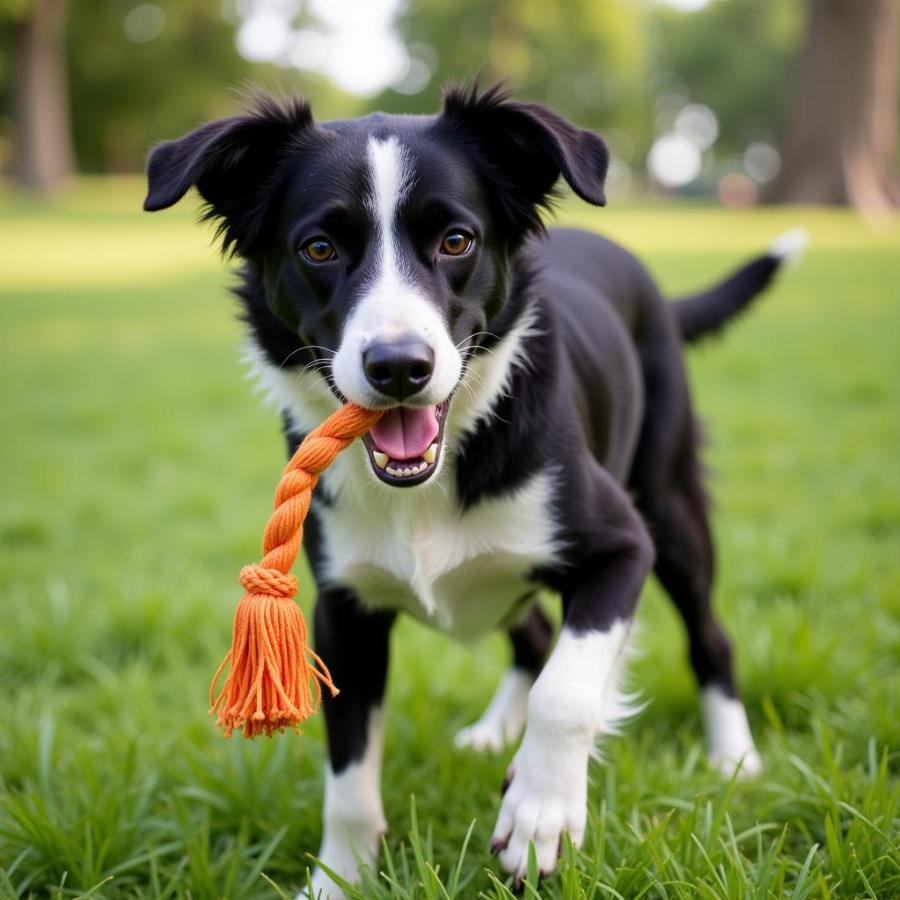The term “homewrecker hot dog” is often used humorously to describe a dog’s mischievous behavior, especially when it comes to destroying household items. While it’s a funny image, it’s important to understand the underlying reasons for destructive chewing and how to address it, so your furry friend doesn’t actually live up to the “homewrecker” moniker. This article will delve into the common causes of destructive chewing in dogs, explore breed-specific tendencies, and provide practical solutions to protect your home and keep your dog happy and entertained.
Why Do Some Dogs Become “Homewreckers”?
Several factors can contribute to a dog’s destructive chewing habits. Puppies, for example, explore the world with their mouths, much like human babies. This teething phase can be particularly destructive, as they seek relief from sore gums. Boredom and lack of exercise can also lead to destructive behavior in dogs of all ages. A dog left alone for extended periods with nothing to do might turn to chewing on furniture, shoes, or anything within reach. Separation anxiety can also manifest as destructive chewing, as the dog tries to cope with the stress of being alone. Additionally, some medical conditions, like nutritional deficiencies or dental problems, can cause increased chewing. Finally, certain breeds are simply more prone to chewing due to their inherent energy levels and genetic predispositions.
Breed-Specific Chewing Tendencies
While any dog can develop destructive chewing habits, some breeds are known to be more orally fixated than others. Retrievers, for instance, are bred to retrieve objects with their mouths, so they have a natural inclination to chew. Similarly, herding breeds like Border Collies and Australian Shepherds might channel their herding instincts by nipping and chewing. Terriers, bred to hunt and kill vermin, also have a strong prey drive that can translate into a tendency to chew. Understanding your dog’s breed-specific tendencies can help you anticipate potential chewing problems and proactively implement preventive measures.
 Border Collie with Chew Toy
Border Collie with Chew Toy
How to Stop Your “Homewrecker” Hot Dog
Addressing destructive chewing involves a multi-pronged approach. First, provide your dog with plenty of appropriate chew toys. Choose durable, non-toxic toys made of materials like rubber, nylon, or rope. Rotate the toys regularly to keep your dog interested. Second, ensure your dog gets enough physical exercise and mental stimulation. Daily walks, playtime, and training sessions can help burn off excess energy and reduce boredom. Third, create a safe and stimulating environment for your dog when you’re away. Consider crate training or confining your dog to a dog-proofed area. Fourth, address any underlying anxiety or medical conditions. Consult with a veterinarian or a certified dog trainer if you suspect your dog’s chewing is related to separation anxiety or a medical issue.
What If My Dog Chews on Everything But Toys?
Sometimes, despite your best efforts, your dog might still prefer chewing on forbidden objects. In these cases, you can use taste deterrents to make these items less appealing. Bitter sprays or hot sauce can discourage chewing, but make sure they are pet-safe. You can also redirect your dog’s chewing behavior by offering an appropriate chew toy whenever you catch them chewing on something they shouldn’t. Consistency and positive reinforcement are key to success.
Conclusion
While the term “homewrecker hot dog” is often used in jest, destructive chewing can be a serious problem for dog owners. By understanding the underlying causes, providing appropriate chew toys and enrichment, and addressing any underlying anxiety or medical issues, you can help your dog develop healthy chewing habits and protect your home from destruction. Remember, a happy dog is a well-behaved dog!
FAQ
- What are some good chew toys for puppies? Teething toys made of soft rubber or silicone can soothe sore gums.
- How much exercise does my dog need? The amount of exercise varies depending on breed, age, and energy level, but most dogs benefit from at least 30 minutes of exercise daily.
- How can I tell if my dog has separation anxiety? Signs of separation anxiety include destructive chewing, excessive barking, and house soiling when left alone.
- Are taste deterrents safe for dogs? Yes, most commercially available taste deterrents are safe for dogs, but always check the label to ensure they are pet-safe.
- What if my dog continues to chew destructively despite my efforts? Consult with a certified dog trainer or veterinarian for professional guidance.
Further Reading
- Dog Chewing: Causes and Solutions
- Choosing the Right Chew Toys for Your Dog
- Understanding Dog Anxiety
Beaut Dogs is your one-stop shop for all things related to dog care. We provide expert advice on everything from choosing the right breed to providing the best possible care for your furry companion. For personalized support and detailed answers to your dog-related questions, please contact us at [email protected]. Beaut Dogs is committed to helping you build a strong and loving bond with your canine companion. Visit us at https://beautdogs.com.